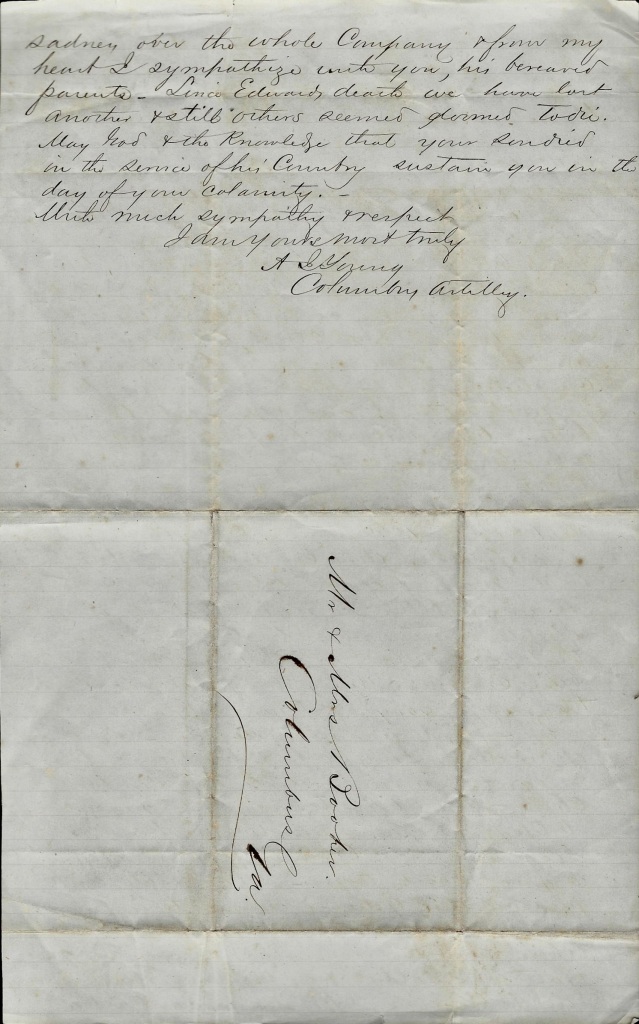The following letter was penned by Alfred Irving Young (1838-1890), the son of William Henry Young (1807-1894) and Ellen Augusta Beall (1812-1892) of Columbus, Muskogee county, Georgia. Alfred was 23 when he enlisted in Capt. Croft’s Battery Light Artillery at Columbus, Georgia, in November 1861. He was elected 1st Lieutenant but often commanded the battery (“Columbus Artillery”) in the absence of the captain.

Capt. Croft’s light artillery saw active service attached to various cavalry commands, earning the nickname “Croft’s Flying Artillery.” The battery is the subject of a 1993 history titled, “Haulin’ Brass: A Confederate Chronicle of Capt. Croft’s Flying Artillery Battery, Columbus Georgia,” by William Forbes.
The battery was recruited in 1861 largely in Russell and Muskogee counties and mustered into Confederate service at Columbus, Georgia, in early 1862. It was initially armed with four six-pound and two twelve-pound guns, reduced in late 1862 to two of each. It served first at Savannah, and in May 1863 transferred to Mississippi and in 1864 served in the Atlanta Campaign, fought with Hood in Northern Georgia and Tennessee. In August 1864 they were with Ross’s Texas cavalry in a hard-fought engagement at Lovejoy Station against Kilpatrick and in November were attached to Forrest and in fighting at Murfreesboro in December slowed a Federal charge, giving Forrest time to rally his men. After Nashville the battery was dismounted, having used a mix of mules and horses, and the men assigned to heavy artillery at Mobile. In the evacuation of Mobile they converted to infantry. The battery surrendered under Gen. Richard Taylor in May 1865 in Mississippi and was designated at the time as Young’s Light Battery, Williams’ Battalion, Smith’s Brigade.
I don’t see any evidence that Lt. Young was ever promoted to Captain though he frequently carried out the duties of command which would have included writing such letters as the following, providing the particulars of the death of a member of the battery to the grieving parents of the deceased. The deceased soldier was James Edward Booher who enlisted at the age of 17 in the Columbus Artillery in November 1861. That he exhibited immaturity early in the service is suggested in this letter as well as the fact that he was court-martialed on 1 July 1862 though his offense is not identified. He was apparently not dismissed, however, for he remained on the rolls until he died on 1 September 1862 at Camp Miller, 16 miles below Savannah.
The letter was sent to James’ father, David Lehman Booher (1811-1887)— a merchant in Columbus, Georgia, who came to Georgia from Montgomery county, Ohio, about 1842. At the time of the 1860 US Census, David owned a family of 7 slaves. His wife was Elizabeth Nutts.
See also—1862: Christopher Columbus McDaniel to Nancy Clementine Childs.
Transcription
Savannah, Georgia
September 3d 1862
Mr. & Mrs. Booker,
I feel it a very sad duty to write you the particulars of your son Edward’s death. Nothing was so unsuspected to me as his death. On the morning of the night of his death, he was free from fever and apparently much better than he had been (never having been considered dangerously sick by the Surgeon). On that morning he walked about with the aid of his servant boy and at 12 o’clock that day, cast his vote for a member of the company at an election held for Jr. 2nd Lieutenant, indeed he was perfectly rational and appeared to be much better. Towards dark he lost consciousness & his breathing was very labored. From that time he continued to get worse until he died at half past eleven o’clock on the night of the 1st September. Everything was done for him that could possible be done. On the morning of the 1st when he seemed so much better he requested that you should be telegraphed to come down that he was sick, which was done. Had he been considered dangerously sick, I would have telegraphed myself to you but he seemed so very much better it was not necessary.
The night of his death I was confined to be with fever. I regret exceedingly that the Sergt. in charge of his body to Savannah neglected to telegraph you of his decease before the body arrived in Columbus as it was necessarily a great shock to you. I can state with pleasure that Edward seemed to improve in every respect in the last few months—his whole character changed and he was as good and faithful a soldier and as clever a man as was in the company. His death has cast a sadness over the whole company & from my heart I sympathize with you, his bereaved parents. Since Edward’s death, we have lost another & still others seemed doomed to die. May God & the knowledge that your son died in the service of his country sustain you in this day of your calamity.
With much sympathy & respect, I am yours out truly, — A. I. Young, Columbus Artillery


